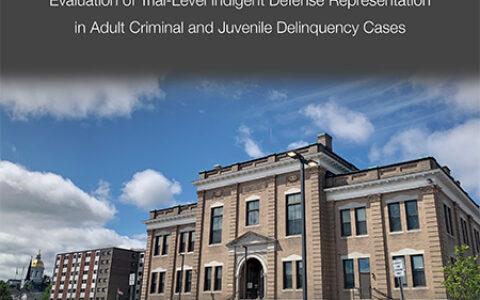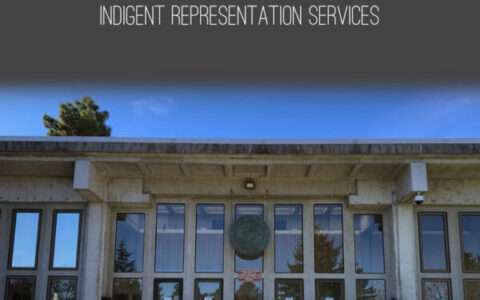Keyword
232 Results
-
Strike 6: New lawsuit hits in San Mateo County, California
Pleading the Sixth: For years, the San Mateo County Private Defender Program has been touted as one of the best in California. But several reports over the years and a new lawsuit filed in March call that claim into question, highlighting the program’s persistent problem in complying with national and…

-
New Guam report finds judicial influence over indigent defense
Pleading the Sixth: Guam’s indigent defense system is not independent from the judiciary, impacting the provision of the right to effective assistance of counsel on the island. A new 6AC evaluation explains those impacts while recommending that Guam establish an independent commission with full authority to oversee right to counsel…

-
The Right to Counsel on Guam

-
Louisiana Governor institutionalizes political interference
Pleading the Sixth: This week, Louisiana Governor Jeff Landry transferred the responsibility of indigent defense from an eleven-member state oversight board to a single governor appointee. Decisions about employment, contracting, salaries, and funding are now under the purview of a single individual and subject to review by a newly created…

-
South Dakota leaves nation’s “no state funding” list in groundbreaking legislation
Pleading the Sixth: On Gideon Day, March 18, South Dakota’s Governor signed groundbreaking legislation creating a state commission with authority to oversee right to counsel services statewide with overwhelming support from all three branches of state government and various stakeholders. The nation can now celebrate that, for the first time in its history, every…

-
Strike 5: The State of California calls a strike on San Benito County
Pleading the Sixth. The State of California calls a strike on itself in a new state report that finds “there are signs that effective representation is not being provided” in San Benito County. Since 2020, constitutional right to counsel deprivations have been exposed in Fresno, Santa Cruz, Lake, and Kern…

-
The Right to Counsel in Lake County, California
At the request of the County of Lake, 6AC conducted an evaluation of trial-level indigent representation services provided in the county. The Right to Counsel in Lake County, California (February 2023) shows that the State of California has not established any means to ensure that Lake County provides to every indigent defendant an attorney who has the time, training, and resources to provide effective representation at every critical stage of a criminal case. Lake County has established an indigent representation system that is completely devoid of basic oversight. The absence of systemic accountability has allowed deficiencies in the provision of direct services to indigent defendants to become institutionalized. The U.S. Supreme Court describes this as the constructive denial of the Sixth Amendment right to counsel.

-
The Right to Counsel in Oakland County, Michigan
The State of Michigan delegates to its counties, cities, townships, and villages the responsibility for establishing and administering indigent defense systems to effectively represent indigent adult defendants who face possible incarceration for crimes in the trial courts. Funded through the Michigan Indigent Defense Commission at the request of Oakland County, 6AC evaluated Oakland County’s system for providing the right to counsel in those trial courts for which the county government is fiscally responsible – the Sixth Judicial Circuit Court and the 52nd District Court – in an effort to aid the county in determining the feasibility of creating a public defender office. 6AC’s report, The Right to Counsel in Oakland County, Michigan: Evaluation of Trial-Level Indigent Defense Services in Adult Criminal Cases (October 2022), concludes that Oakland County’s assigned counsel compensation method creates economic disincentives that impair defense counsel’s ability to provide effective representation and that indigent defense attorneys’ workloads are not controlled to permit effective representation and that indigent defense attorneys do not continuously represent and personally appear at every court appearance throughout the pendency of the case.

-
The Right to Counsel in New Hampshire
The State of New Hampshire has vested in the New Hampshire Judicial Council (judicial council) the entirety of the state’s Fourteenth Amendment obligation to ensure effective Sixth Amendment services. At the request of the judicial council, through the U.S. Department of Justice, Bureau of Justice Assistance, 6AC conducted a statewide study of the indigent representation services provided in the trial courts in adult criminal and juvenile delinquency cases. 6AC’s report, The Right to Counsel in New Hampshire: Evaluation of Trial-Level Indigent Defense Representation in Adult Criminal and Juvenile Delinquency Cases (October 2022), concludes that New Hampshire’s indigent defense system is inadequately funded and lacks the structural safeguards necessary to ensure the provision of effective assistance of counsel to every indigent defendant, as required by the federal and state constitutions, allowing for the possibility of both actual and constructive denial of the right to effective assistance of counsel to at least some indigent defendants.

-
The Right to Counsel in Illinois
The State of Illinois delegates to its counties and trial court judges the responsibility for providing and overseeing attorneys to effectively represent indigent defendants in the trial courts, and it delegates to its counties nearly all of the responsibility for funding the right to counsel of those indigent defendants. services. Yet Illinois is one of only seven states that do not have any state-level mechanism to oversee any aspect of trial-level right to counsel services. As a result, Illinois cannot accurately say how many people or cases, and of what case types, require appointed counsel nor by whom the representation is being provided, if at all, and the state cannot know how much the provision of indigent representation should cost nor how to provide it effectively in all 102 counties. At the request of the Illinois Supreme Court and the Administrative Office of Illinois Courts, 6AC conducted a multi-year, statewide study of trial level indigent defense services. The Right to Counsel in Illinois: Evaluation of Adult Criminal Trial-Level Indigent Defense Services (June 2021) explains how, in some circumstances, indigent defendants in Illinois are actually deprived of counsel at a critical stage of their criminal case. In other instances, an indigent defense system attorney is appointed but under circumstances that cause a constructive denial of the right to counsel.

-
The Right to Counsel in Santa Cruz County, California
In its attempt to fulfill the right to counsel responsibilities delegated to it by the state, for decades Santa Cruz County has chosen to use private attorneys to provide all indigent representation services. Santa Cruz County is considering how best to provide indigent representation services when its existing contracts with private law firms expire on June 30, 2022. Santa Cruz County does not have an office or person charged with oversight of the entire indigent representation system (both primary and conflict), and the county cannot accurately say how many people or cases, and of what case types, require appointed counsel nor by whom the representation is being provided, if at all. In the absence of this information, it is impossible for the county to determine how much the provision of indigent representation should cost or how to provide it effectively. It is toward that end that the County of Santa Cruz commissioned the Sixth Amendment Center to conduct this evaluation. The Right to Counsel in Santa Cruz County, California: Evaluation of Trial Level Indigent Representation Services (September 2020), explains how Santa Cruz County has delegated all decision-making about the provision of the right to counsel to the private law firms with which it enters into contracts, but without requiring those contract law firms to report information critical to knowing whether they are providing effective assistance of counsel.

Support Our Work
Criminal justice issues that disproportionately harm poor people, such as wrongful convictions and over-incarceration, cannot be fixed if indigent defendants are given attorneys who do not have the time, resources, or qualifications, to be a constitutional check on government. Yet, investment in improving indigent defense services remains largely neglected. The Sixth Amendment Center is the only nonprofit organization in the country that exclusively examines, uncovers, and helps fix the root of the indigent defense crisis in which inequality is perpetuated because poor defendants do not get a fair fight.
The Sixth Amendment Center is a tax-exempt 501(c)(3) nonprofit organization under EIN: 45-3477185.
Donations are tax-deductible to the fullest extent allowable under the law.